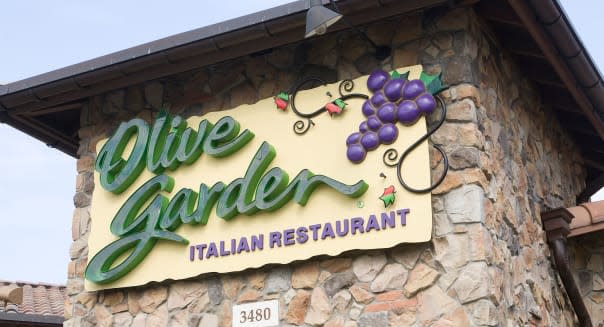Olive Garden Has a Lot to Prove to Avoid Red Lobster's Fate

"When you're here you're family," is the old slogan of Darden Restaurants' (DRI) Olive Garden, but the restaurant operator's family is getting smaller. Darden finally found a buyer for its Red Lobster chain last week. A private equity firm is snapping up the struggling seafood eatery in a $2.1 billion deal.
The market wasn't as excited about the transaction as you might think. Shares of Darden actually closed 4 percent lower when the news broke on Friday. Darden is using the proceeds to pay down its debt and buy back shares, but some activists are arguing that it could have scored a better deal for Red Lobster.
However, the real problem with Darden is that its flagship chain -- one that will become even more important to its bottom line with Red Lobster gone -- isn't doing so well itself. Olive Garden is also in a funk, and if it doesn't turn its fortunes around, it might be the next Red Lobster.
Making Dough Out of Unlimited Breadsticks
Red Lobster was unloaded because of its declining popularity, but it's not as if Olive Garden is at the top of its game. Same-restaurant sales at Red Lobster dropped an embarrassing 8.8 percent, 5.2 percent, and 4.5 percent in its three most recent quarters, but Olive Garden has also seen average sales decline at the individual restaurant level during those same three quarters. Olive Garden's comps in its most recent report clocked in at a negative 5.4 percent. Darden's fiscal third quarter includes the snowstorm-smacked months of December and January, but even in February we saw Olive Garden restaurant traffic check in 4.6 percent lower than it did a year earlier. In other words, it's not about the weather.
%VIRTUAL-article-sponsoredlinks%Making matters worse, restaurant expenses and depreciation and amortization expenses were higher on a percentage of sales basis at Olive Garden. In other words, it's getting less profitable to run an Olive Garden.
This is a problem, of course. Diners are staying away from the chain that once wowed them with bottomless salad bowls and unlimited breadsticks. Menu tweaks including new premium salad toppings and an actual hamburger haven't exactly paid off. That's going to be a problem now that Olive Garden is going to be a bigger part of the Darden story.
Rock Lobster
Olive Garden was already the largest contributor to Darden's performance. The 836-unit chain accounted for $929 million -- or 42 percent -- of the $2.23 billion that Darden rang up in its latest quarter. Red Lobster's 706 eateries brought in $611 million during the period, or 27 percent of the sales mix.
Darden has several other concepts. Casual carnivore hotspot LongHorn Steakhouse is its third largest concept -- there are 453 of its peanut-shelled roadhouses. Smaller concepts include Caribbean themed Bahama Breeze, upscale chophouse The Capital Grille, and healthy food haunt Seasons 52. These chains don't exactly move the needle, but every one of them held up better in terms of comparable restaurant sales during Darden's most recent quarter. In fact, LongHorn, Bahama Breeze, and The Capital Grille actually delivered positive comps.
A lot will change once Red Lobster is handed off. Olive Garden will be accounting for 57 percent of Darden's revenue, making its performance even more important. The more successful smaller concepts will grow form 31 percent of the sales mix to 43 percent. But will that be enough for investors?
If Darden is collecting $2.1 billion for unloading Red Lobster, how much more would it net in a sale of the larger Olive Garden? Those proceeds could be use to buy back shares and aggressively expand its smaller eateries that seem to be offering more upside at the moment.
This is why Olive Garden has a lot to prove in the coming quarters. If Darden can't turn it around, there's nothing to stop it from throwing in the dishtowel before things get even worse. Time is not kind to chains in decline. Darden could've sold Red Lobster a year ago for a lot more than $2.1 billion, before comps and operations started to deteriorate. If it can't fix Olive Garden, the clock is ticking for it to find buyers who think they can.
Motley Fool contributor Rick Munarriz has no position in any stocks mentioned. The Motley Fool has no position in any of the stocks mentioned. Try any of our newsletter services free for 30 days.

